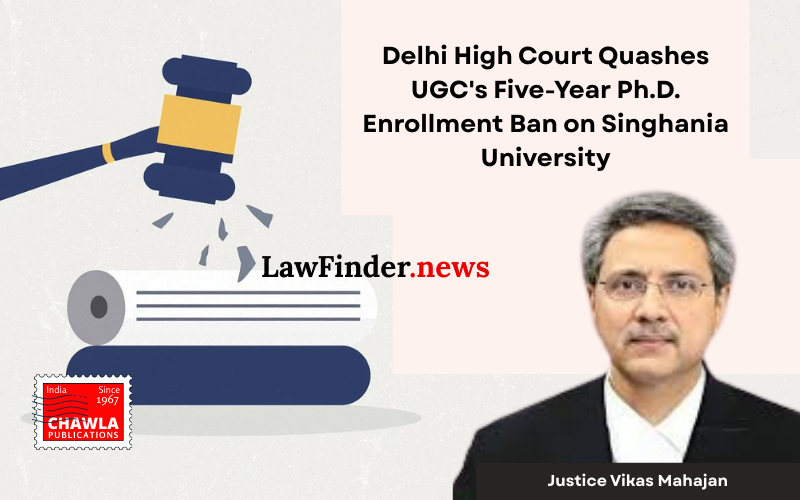University Grants Commission (UGC) cannot impose penalties not prescribed under the UGC Act or the Regulations framed thereunder, and actions exceeding its statutory powers are ultra vires.
In a landmark judgment dated September 15, 2025, the Delhi High Court ruled in favor of Singhania University by quashing the University Grants Commission's (UGC) order that barred the institution from enrolling Ph.D. students for five years. The UGC had issued an order and a public notice on January 16, 2025, prohibiting Singhania University from enrolling Ph.D. scholars from the academic year 2025-26 to 2029-30, citing non-compliance with UGC regulations.
The issue arose when the UGC, following complaints from stakeholders about alleged violations of Ph.D. regulations by Singhania University, initiated an inquiry and issued a show-cause notice to the university on October 23, 2024. The UGC's Standing Committee, after evaluating the university's responses, recommended the enrollment ban, which was subsequently approved by the UGC in its 586th meeting on December 23, 2024.
The university, established under the Singhania University, Pacheri Bari (Jhunjhunu) Act, 2008, contested the UGC's decision on two primary grounds. Firstly, they argued that the UGC failed to comply with the principles of natural justice by not providing the university with crucial documents, including the sub-committee's final report and meeting minutes that were referenced in the show-cause notice. Secondly, Singhania University contended that the UGC lacked the statutory authority under the University Grants Commission Act, 1956, or any related regulations, to impose such a penalty.
The court, presided over by Justice Vikas Mahajan, agreed with Singhania University, highlighting that the UGC Act does not explicitly empower the UGC to impose penalties such as debarring a university from enrolling Ph.D. students. The court referenced the principles of administrative law, emphasizing that any breach of natural justice must also demonstrate real prejudice to warrant the nullification of the UGC's decision. In this case, the court found that the university did not suffer such prejudice from the non-disclosure of committee reports.
The court also addressed the UGC's broader regulatory powers, concluding that statutory bodies like the UGC cannot impose penalties beyond the authority conferred by their parent statute and regulations. The court referenced several Supreme Court decisions to support its judgment, reinforcing the principle that statutory bodies cannot impose penalties not prescribed by law.
Consequently, the Delhi High Court ruled that the UGC's action was ultra vires the UGC Act, leading to the nullification of both the order and the public notice issued by the UGC. The decision serves as a reminder of the importance of adherence to statutory provisions and the principles of natural justice in regulatory actions.
Singhania University v. University Grants Commission, (Delhi) : Law Finder Doc Id # 2778913




